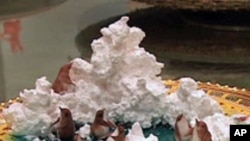Chinese culture centers around food, and imperial cuisine elevates Chinese food to a rarified art form. In the past, only the emperor and his family could eat imperial food. But now in communist China, anyone can eat imperial food - that is, anyone who has enough money.
It took Meiweizhen Restaurant's chef Bai Wei two days to put together a concoction of. "This dish was made everyday for the Empress Dowager, but it wasn't made to eat, just to look at," he said.
China's last dynasty fell nearly a century ago. The People's Republic of China was founded in 1949 with a strongly anti-imperialist vision.
Meiweizhen did not allow VOA to film while people were dining because it said its customers prefer to remain discreet. But the pictures on the wall indicate that at least some of the patrons are from the new elite, people like Chinese Premier Wen Jiabao and basketball star Yao Ming.
Meiweizhen's location also suggests its clients have ambitions of commercial success. It is at the China World Trade Center, with one entrance on the street level and one entrance in the shopping mall.
Chef Bai comes from a family of imperial chefs. His grandfather prepared food for Puyi, the last emperor of China. The food he prepares now is a meticulous recreation of imperial recipes he researched in the archives of the Forbidden City, where the emperor lived.
"This dish, when I've finished making it, it's very satisfying. Not only is it delicious, it's also like a piece of art," he says, "I can't bring myself to eat it, though.
He acknowledges imperial food is much more expensive than the cost of the mostly common ingredients, like leeks or potatoes. But he says this food, and its complex preparation, are cultural traditions of China, and should be priceless.




